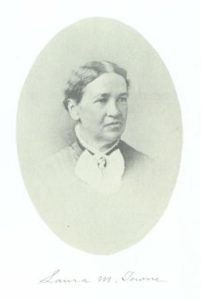
Laura Towne
Laura Matilda Towne was born on this date in 1825. She was a white-American educator and abolitionist.
From Pittsburgh, Pennsylvania, Towne studied homeopathic medicine privately and attended Penn Medical University. In the 1850s and '60s, she taught in charity schools in various northern towns and cities. Early in 1862, she answered an appeal for volunteers to teach, nurse, and help former slaves freed in the Union capture of Port Royal and other Sea Islands area of South Carolina. She arrived at St. Helena Island, SC, in April of that year.
Soon, Towne was teaching school, practicing medicine, and helping to direct the distribution of clothing and other goods to the area's Blacks. In September 1862, Towne established the Penn Normal School, one of the earliest Freedman's Schools. Through her, Penn had a detailed curriculum patterned on the (then) tradition of the New England system. By 1867, she had devoted herself entirely to the school, which remained for decades the only secondary school available to the Black population of the Sea Islands. From 1870, teacher-training courses were also offered.
The school was supported only by the Pennsylvania Freedmen's Bureau, later by the Benezet Society of Germantown, Pennsylvania, and later by various members of Towne's family. Towne herself lived on her modest inheritance and worked for free. She served the Sea Islanders as an informal adviser on legal issues, public health, and temperance. She conducted the school until her death at Frogmore, her restored plantation on St. Helena Island, on February 22, 1901. The school was renamed the Penn Normal, Industrial, and Agricultural School a short time later.
The name emphasized the label and vocational training Towne had always resisted. In 1948, Penn became part of the South Carolina public school system.
African Americans and South Carolina:
History, Politics, and Culture
University of South Carolina-Aiken